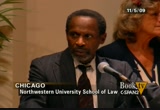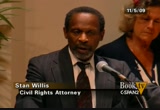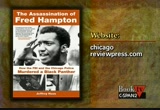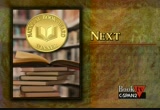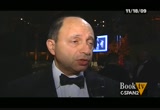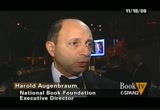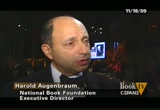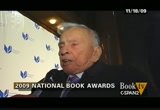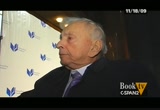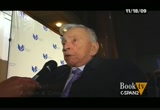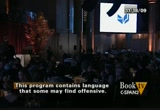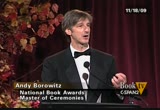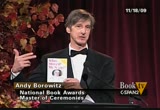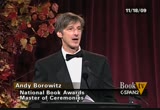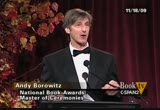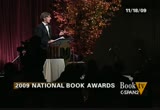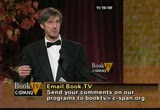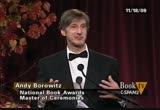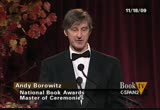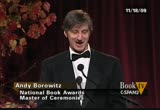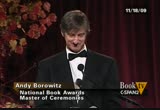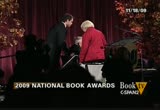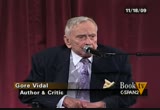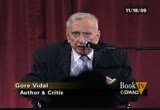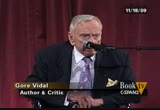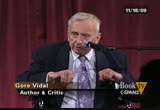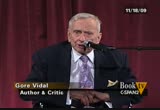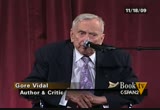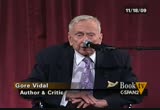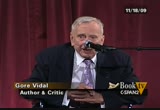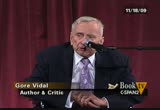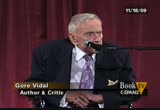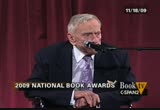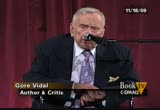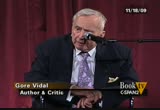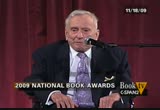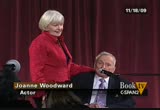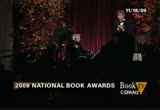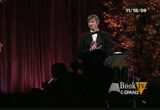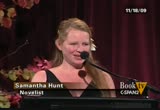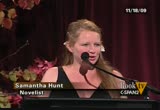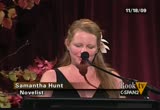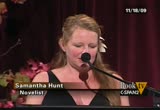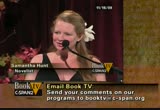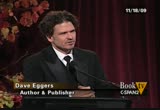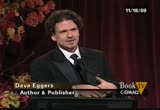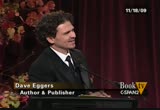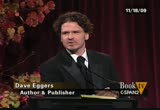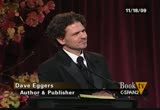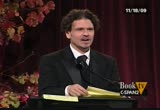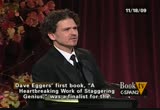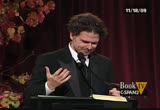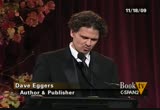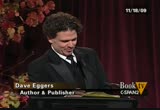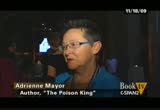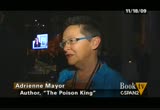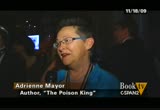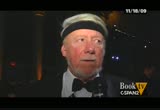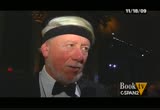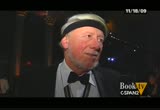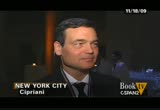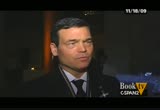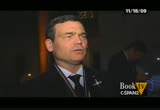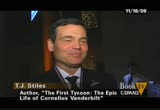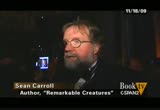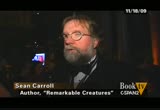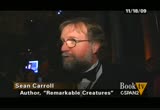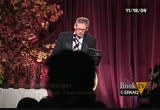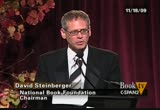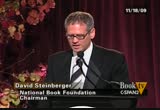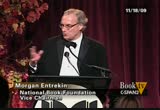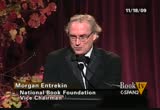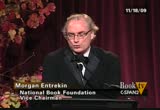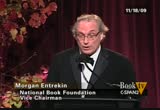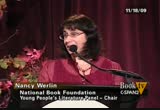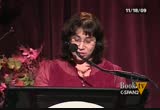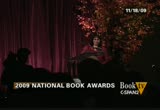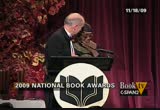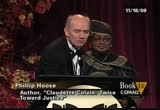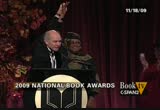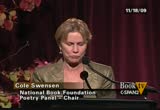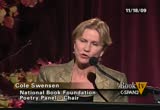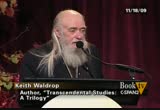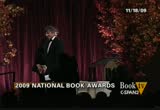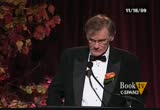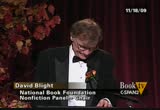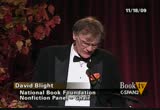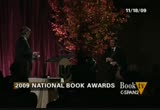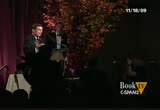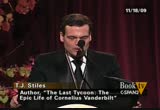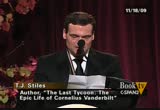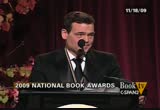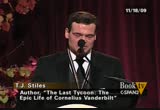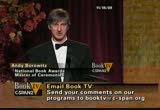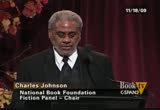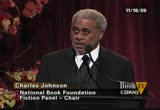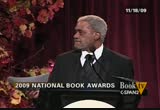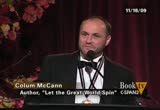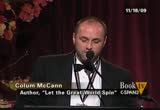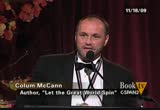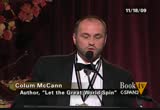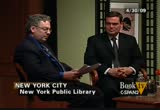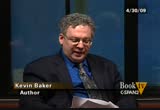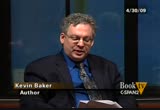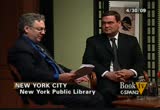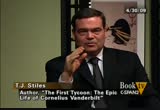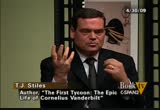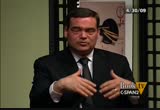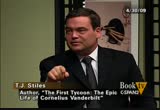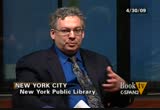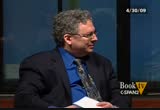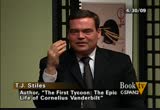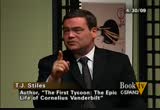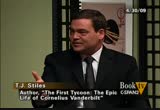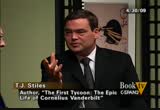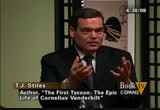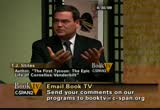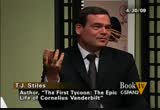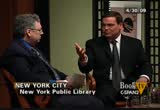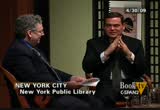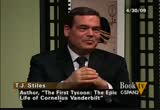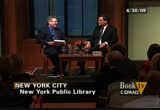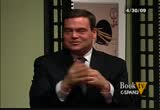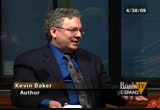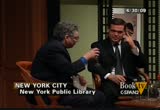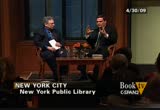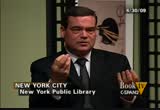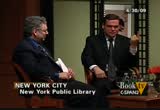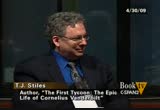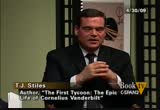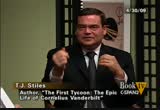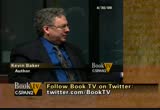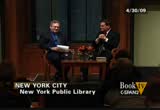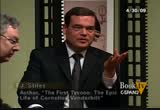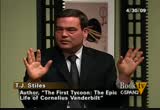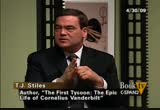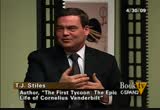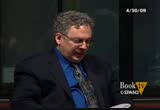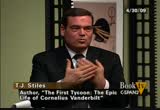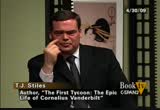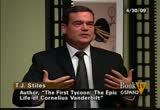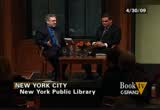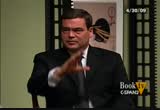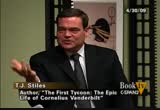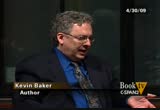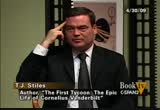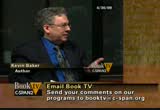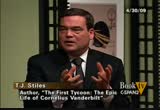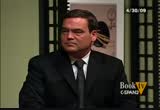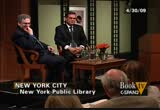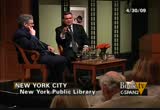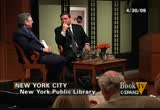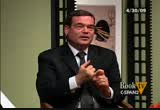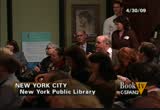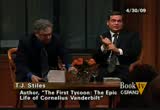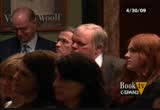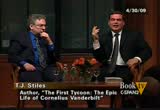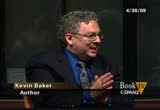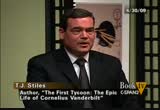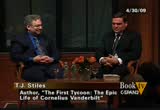tv Book TV CSPAN January 3, 2010 3:00am-6:00am EST
3:10 am
>> ladies and gentlemen, andy borowitz. [applause] >> thank you very much, and ladies and gentlemen before we begin, let's have a warm round of applause for all the nominees for the 2009 national book award. we can do much better than that. [applause] i believe it was george bernard who wrote what a cluster, and i believe that sums up very well. ladies and gentlemen, i have got to tell you when i first heard the national book awards wanted me to host this evening i was like i would be so honored i would like do it for free, and it turned out they had the exact same idea.
3:11 am
[laughter] but i think that is in the spirit of the evening because that is what publishing is all about. [laughter] a lot of hard work and then nothing. so let's hear it for publishing. we are all on this sinking ship together. yes. [applause] now i have to confess and this is true that when the letter came in the mail that said national book awards there was a moment i thought to myself finally this is my eight year. i'm finally being recognized for my contribution to literature. i love that word, literature. it means the same thing as literature only on charlie rose. [laughter] i love that. and this wasn't beyond the possibility because i do in fact have a book out this year called who moved my soap the guide to
3:12 am
surviving in prison. [laughter] actually c-span if you come in a little closer you will see that this is $9.95 ed barnes and noble. but anyway i thought this isn't like a typical national book awards type of book but maybe this year the judges are going to be a little imaginative and think outside the box. they can't give it to philip roth every year. so then i opened the envelope and saw that in fact they were asking me to host the awards and i was like that's cool because it is an honor. it is a big honor and it is also probably good for my career because on the next edition of whom moved my soap it will save from the national book award hosting writer. [laughter] and no one knows what that means. it's like a national best seller. nobody checks to find out.
3:13 am
that means you are a best seller for one week in akron. no one checks. but as i read this letter from the national book foundation it did start to rankle a little bit because i realized when it comes down to but i was being asked to come here to give an award i could have won two other writers deemed more deserving. that is the situation tonight. let's not kid ourselves that is what is going on. and this brought back bad memories of something that happened a couple of years ago i got a letter from the eckert their foundation, the genius grant people and i was excited i opened that letter and found out that the macarthur people wanted me to nominate someone else to be a genius. [laughter] there is a moment i thought to myself well the man who its chosen to choose other genius is, that must be the greatest
3:14 am
genius of all. [laughter] but even my power of rationalization which i have got to say or of some couldn't really make that work. i mentioned philip roth before he in addition to winning the national book award. i received a letter this year from the pulitzer committee informing me wrong i was not eligible for a pulitzer prize. are you beginning to see a theme developed but for the writers in the audience you've probably figured it out because you guys deal with these everyday in your work. but for the agents that me bring you up to speed for a minute. the fema here is this respect. in the world of literature and i am not respected all and i don't take it personally. i know it is not a comment on my talent. it couldn't be a comment on
3:15 am
3:16 am
what did he do and then i realized he wrote a novel, he wrote that awful shop girl i could do that. i could be a novelist and that is a growth industry if ever there is one. it's like novelist, blacksmith, you know, it is like a great thing to be in. so, i told my agent is he here to fight? this is a true story. i said i'm writing an awful and he got very excited and he gave me a good piece of advice. he said you've got to grab them in that first line of your novel you have got to get their attention and make them keep reading because if you don't with that first line you have lost them. now this was a very powerful
3:17 am
piece of advice because this sent me into a spiraling case of writer's block that i have had for the last year because i have just been sitting down trying to write and read right and the first line of my novel and i thought since tonight i have the brain trust of american literature in one room i could maybe try out some of the lines i've been writing and he could help me decide. are you up for that, can you do that? okay. okays a picture yourself when opening your book or what's that thing barnes and noble has got, the nookie. [laughter] and you are reading the first line of unlawful here's the first one. there were better times, there were no worse times. [laughter] okay. you've made your opinion quite clear. thank you. here's another one.
3:18 am
then we are in agreement, gentlemen, he said, his eyes darting from one and conspiratorial another betsy ross must die. [laughter] it's going to be a kind of historical story. here's another one. i like this one. she walked across the room towards him letting her red satin dress fall to the floor and suddenly there they were, her boobies. [laughter] now, you see, that's sexy. people say it's hard to write and i don't know. i don't get it. it's like boobies and then you are in. here's another one. there were better times and worst times of all wrapped up together in one big package in
3:19 am
times. here's another one. we were a ragtag team at best with a map of a prison and rusty shovel. but we were bound together by a common goal, to free o.j. simpson i like that because it gets your reader on your side at the beginning. here's another one. when i was 14-years-old i felt in love with the girl next door, mary margaret and i've been stalking her ever since. [laughter] this dockery is here tonight, interesting. just three more. better and worse that's what they were well, times wise. [laughter] i think i've nailed that one. there's two more. i've often been asked what it's
3:20 am
like having the world's longest penis. [laughter] i put that in there because i want to show i can write for women. [laughter] the second line of that one is well, here it is. the end. [laughter] i've saved the best for last, here is the last first line from my novel. i'm sure you've heard stories about bad dogs and a very bad dogs. but my dog, charlie, was a fucking asshole. thank you. thank you. are you ready for the show? [applause] all right. now our first presenter requires no introduction. on the other hand did require an introduction but didn't get one. so things are a little out of whack. and now to present the medal for
3:21 am
distinguished contribution to american literature is joanne woodward. yes. [applause] [applause] for 50 years she has been a star of stage, film and television. ladies and gentlemen it gives me pleasure to welcome, joanne woodward. [applause] >> on behalf of the national book foundation it gives me pleasure to present the medal for distinguished contribution to american letters to my dear friend of the second love of my life, gore vidal triet [applause] [applause]
3:23 am
[inaudible] don't acknowledge anybody since wisely i think. and i do remember as a kid watching him make his entrance and exit from rooms and halls and parliaments and he was always in a wheelchair and i felt well, the poor man, he can't frolic and play like the rest of us. and then as i entered the artificial limb years i began to be highly sympathetic to this
3:24 am
president. and there is a story that he loved telling about himself and his stability and he would come to the white house and he was not very mechanically minded and he blocked his wheelchair. this is the nightmare of all of this. world war doesn't bother most presidents but that does so find yourself locked in the cabinet room when he want to be in the oval office. yes, mr. roosevelt, we are going to let you out an minute triet he was in the first day of the white house he couldn't make the thing work. he was trapped and there was nobody there and he called for help and help didn't come, and
3:25 am
finally he yelled and somebody came to rescue him and mind you he had only been in the white house about one day and there he was locked in his chair, and so he said the next store was the navy department in the old executive building and he said he was a navy man who always to the end of his life he said get me somebody from the media to look after this thing. he had good expletives, too. he was a terrifying man. his head was this big and it went that way, too so you never knew which side you had coming at you. and so there he was waiting to be rescued and they got a kid
3:26 am
from the navy department who started to push his chair in front of him across the cabinet room and the kid didn't know where he was going so the president is beginning to vanish in one room after another in the white house. and finally the kid panics and the chair runs away, and there is the president racing across to rooms buy then and the police suddenly inspired. he sees an open door that doesn't seem too dangerous. he aims for the door which proves to be supplies to keep a great empire going. in those days it was carbon
3:27 am
paper largely. and suddenly the president is propped with all of this carbon paper still trying to get out and nobody coming to his rescue. and finally he got -- he said in that glorious blease "no presidents assassination is my assumption i shall vanish from your view because i have been filed. laughter come well, as a mother president might have said, i
3:28 am
know you fly in on continental airlines from los angeles, and luckily the pilots were not playing games. that's about as a scary story as i ever heard. but 75 years ago, and i started to count in my head what was i doing 75 years ago? i was flying to los angeles from new york but the world has changed. this is a great thing in those days. i did not fear being fondled but i fear some of the movies i might be forced to observed as
3:29 am
i, too, entered the carbon paper cabinet, which mr. roosevelt was in his jolly way quite content to serve a little time. then one starts to think about all the changes particularly in what say book publishing a subject that has come up tonight. and nowadays it seems the progress of literature is first to print the book and then you pull it and it saves such a lot of time and it is fun for everybody. everybody can dance around the
3:30 am
3:31 am
well, i couldn't tell. and the shadow still goes on. [laughter] it was very nice when i was with a friend on the fifth floor, the newmans were on the sixth floor and the passers-by were on the seventh floor. we feared them. who knows what they might not do. we missed the golden era. we were very noticeable. particularly on the left that kept jamming. anyway, i hope the young comic gentleman -- [laughter]
3:32 am
the -- gets his wish. you've just got to be busy before the pulping. [laughter] it is your only crack at it and you will enjoy it. yeah it's nice to shred the paper. in the old days i've been sitting talking with sydney that nowadays to get a movie made he wishes that harry who were still alive and i said so do i.. [laughter] someone said the last word was orson welles. it did not speak kindly of people who ran studios.
3:33 am
someone said aren't you glad all of those older movie producer types that ran the studios are gone. glad. he said there was always room for an orson welles movie while they lived and there's nothing now there's the voice of heartbreak and heartburn. here we go again. i feel it in the air our brave troops are going to be sent into action. after all, didn't george washington say he who controls afghanistan will carry new jersey?
3:34 am
[laughter] [applause] and here we are in the brave new world, and i'm sorry, if i had a speech i would be getting it. [laughter] that is a promise. absolute promise. bottomline. i've never been in this chamber before but happy to be here with the young man who pushes me around in this thing he is a lieutenant in the united states navy and a veteran at the first gulf war, and he is also the
3:35 am
head of the veterans against america's war of which they are getting too many. he will pass along you recruiting right and left. it is kind of interesting within the military, and i began life in a room in the cadet hospital at west point where i was delivered by a future surgeon general of the army who hadn't been told about navels. i did not have the repairs made. surprised should always be offered, on offer anyway.
3:36 am
in a security world we are not really needed, and it used to be just as an idea united states was something quite remarkable, and now i wonder that we have been crowded over, and it was -- there is a photograph in this new book i've published that's nothing but photographs of myself which is highly satisfactory. [laughter] and perhaps a bit overdone. a young man, a fellow writer always competitive and he saw
3:37 am
that picture of me which they have run on the cover of the book, and he said i didn't know that you were a male model and i suggest, yes, of course i am. who says a male model can't go to the top? [laughter] he smashed his teeth and has not been seen since. so to one and all an italian word [inaudible] it is a nice blessing than i italians in good mood will give you and it means good our doings, made the signs be good under which you lived. [applause]
3:38 am
[applause] >> this is a -- i'm sure everybody's heard this but gore vidal and i have been friends for over, well over 50 years, and it was a wonderful friendship because it wasn't just gore and me, it was gore, me, how word and paul. we have fun. we have really great times. finally paul and i settled down and got married and in due course i had a baby. >> and another one, and another one, and another one.
3:39 am
[laughter] >> the first 1i had of course gore immediately had to be the godfather and so he was holding her dangerously when he was being -- when she was being christened. she got sprayed and she cried and everything and there was a moment of pause and gore looked down and said "always a godfather, never a god." but now you are. [laughter] [applause] >> let's hear it for gore vidal, ladies and gentlemen.
3:40 am
[applause] okay, that's the show ladies and gentlemen, have a good night. no, no, no. we do have more. that is the antiviral on youtube tomorrow. i can tell that much. now, to present the literary award for outstanding service to the american literary community is samantha hunt. her novel, "the invention of everything else," what a prize and was a finalist for the orange price -- [applause] her book, the seas 15 for 45 awards and has appeared in the new yorker, mcsweeney is, public space, cabinet, esquire, the believer, blind spot, tin house, the new york magazine and on the radio program this american life. it gives me great pleasure to
3:41 am
introduce samantha hines. samantha? [applause] >> i was chosen to present the literary award tonight because one of mortal could not crown the achievements of date occurs in this sliver of time allotted. as you can see -- [laughter] i am not on mortal to night. i knew there was something about david early on because soon after we had met my cousin hired a recovering alcoholic to read our terot cards, and when i stepped into the study with her she told me -- and this is the truth, people, believe me this
3:42 am
is the truth, she told me there is a young man with brown, curly hair a publisher pretty close to him. it was good advice. david, you are receiving the literary award tonight for everything you've done in service to the american literary community and you have done almost everything. publishing, editing, writing, book design. you have used your love of language to stir a justice for schoolteachers for the wrongfully imprisoned, the lost boys of saddam and the city of new orleans. googled a thierer shop where children can learn to write for free. any of these efforts singularly would be worthy of this award. but tonight here is a book lover. i want to praise your work as publisher and editor. the talent can sometimes fall under the eclipse of everything else you accomplished but to me as a book lover nothing, not
3:43 am
even good doing can reckon the generosity and the breeding of new literature. i remember an early issue of mcsweeney making me so giddy i had to first sink my stomach back to earth with a hamburger before i opened it. and the journal said on the table beside me humming with such potential it was vibrating and glowing. it was an object of art and mystery. it seemed like a time machine. it was a fraction but brimming with the future of literature and yes a time machine seems appropriate because it is no accident that dave edgars sure this price with legendary rebels rosset and lorentz, editors with no lack of courage with tireless romanticism. david, you launched the next samuel beckett and allen ginsburg on the world and did it at a time when publishing seemed
3:44 am
strapped to life-support. why creating books of tremendous beauty that might not have that other wise, fathomless the new books. do fostered a golden age of literary publishing reminiscent of good old days, lost times i thought i had missed out on. luckily for us you did it right here in the present. the initial correspondence of work force that might be quarterly to explain the arrived like some carow shot backwards and forwards from some gilded new age i think it was the third or fourth transmission i ever received via this new technology e-mail. send us your pieces that have been rejected by other publishers and magazines. it's no wonder then that the writers gave edgar's assembled make such a strange forest. these rejects were at first sampled by readers of some sort of curious delicacy. but under his editorship the
3:45 am
3:46 am
>> i was just telling samantha i didn't know she was with child. it's been a little while putting it isn't fate, it's something become of something to engender sympathy from the audience. i'm going to try to be brief. i have -- i don't have a well-written speech. i'm going to battle a little bit. i'm very nervous. i do this when i am nervous. i'm incredibly nervous to be
3:47 am
here a few minutes after one of my idols of all time, mr. gore vidal who meant everything to me when i was learning how to write and read his words, his intellect, his activism, his ability and willingness to always speak up and hold his government accountable especially has been so inspiring to me i can't predict or articulate, and john woodward and paul newman have meant so much to me with what they have done with their access to audiences and what they have done with their i guess fame, how much they've given back and so anyway, i'm very honored to be here after them and very happy to be listed on people's barney rosset i think it is ludicrous for me to be included or have my name spoken in the
3:48 am
same sentence of theirs and i don't feel like i've earned it but i will take this on our as a challenge to someday earn it and try to run it every day. but i'm so happy to be introduced by samantha hunt, who i think i discovered through the mail through mcsweeney as we found this incredible voice and that is what we try to do is find these strange forest of voices and i love that expression so much because we were thinking that we were outsiders and feeling like what we needed to do more than anything was find a place to home a safe spot for people that wouldn't find publishers and find audiences otherwise and we love to rescue those folks with their they were new ways is or old ways is now neglected and give them a safe place and honor their words and put them as beautiful packages as much as possible so the words might endure. i love the idea of strange and
3:49 am
it's what i thought of when i first read samantha's work. she comes in a very mainstream presentable package as you can tell she looks very normal, but she's very strange on the page. she spent four years on an imaginary biography of the inner workings of the mind of nicholas hesla and it's a strange book and takes a strange person to devote that much time to it. but i think that that book found many readers for publishing it and it ended up being published a very well by fsg. so i think this is a room full of strange people who would have a bidding war on a book about michael less tessla so that is why i'm happy to be among you. i've had a blast seeing you who haven't seen in many years and i am honored to be on long you. and, you know, in general we
3:50 am
celebrate the strange [inaudible] this is a nonprofit with seven centers across the country that tried to get kids interested and passionate about reading and writing starting with the very basics and the nuts and bolts of getting their homework done trying to incorporate the community's competitors, graduate students and anyone with an interest in the written word and trying to communicate that to young people and that are just coming after school with help for their homework and we get them that they want to publish and right and they want to find that power, the self empowerment that comes most democratically through the written word, and so what we say to all of the centers is keep it weird. [laughter] when people come to us and say how we start a center like valencia, yes, we start behind a shop in brooklyn we operate behind a super hero crimefighting shop and in boston it's behind a shop that sells supplies to the seekers of bigfoot and other zoology
3:51 am
specimens and we say "keep it weird" triet writing is a weird enterprise. this isn't robotics or engineering giving it should be a safe place for the strangest thoughts, things you cannot alter or express any other way. and so anyway there's somebody at every table that has helped a26 national. we've got help, donations for sponsorships combinations for books and never has anyone doubt it or pause or said why or what do you mean or what is this all about, everyone says how many books do you need, what do you need and where do we send them. it has been an incredibly familiar and familial supportive group and again, i feel very honored to be here. i cannot publishing pretty late and without any formal training. and i feel like i've been
3:52 am
embraced and nurtured by so many people, some of you who are here and i just want to see one more thing, i feel like this is a golden time for publishing. i am an eternal optimist and i think this is the most exciting time, democratic time there's a pluralism and publishing a think is unprecedented and there are signs of so many great things to come. limites make it is about to do the books so that's great among other things. last night -- i teach a class every week every tuesday night at a26 it is a group of high school students from the area, high school students that come every week from six to 8:00 to read from literary magazines run the country and the world and they compile their favorite pieces into something called the best american long required reading and if you can see this happening, anybody that ever has any sort of sense of pessimism may be about the future of the written word, the future of the
3:53 am
printed word whether or not high school kids love the word as we did when we were young you wouldn't doubt for a minute. you would be full of optimism and have every pessimistic fought in your mind turned around overnight, and i told them we met last night and i told them i was coming here and i said what you guys say to this audience a be a few of whom were concerned on books printed on paper in particular have here is a few of the things they said. from charlie she said i will only read books on paper. that's how my parents read to me and the only way i will do it. [applause] and then she went off with an expletive or two on surgeon electronic reading device we won't mention. so, khloe said when asked about
3:54 am
the existence of teenage readers who get excited when they open the new issue of the canyon review we do exist, she yelled and we like books and can't or don't want to stare at screens all day. as a kid named joseph as a cartoonist i've known him since he was eight and he is an extra incredibly astute reader and passionate guy. he said if there was a perfume that smelled like books i would buy a shitload of it. [laughter] i let them swear once a class period. so that was that one. and then finally, there was one more student, his name was pc and he sits in the back very little, very shy. he has long hair he grows long so no one can see his office to
3:55 am
become eyes. i said what would you say to anyone that is counting the future of the printed world and is out there listening and whether to keep doing what we are doing and how to do it and he said it cannot know where it's so hard to get him to talk about anything. he reads everything but it doesn't come out and volunteer his opinions but he said, on, man, just trying to become try to read donner you love it? he said, on man, just try. so i want to thank you all for what you have done for the written word for inspiring everybody at mcsweeney is and a26 international to honor the work of our literary predecessors. i have james salter at my table. can i say that? [applause] we are always keeping in the year opened two new voices. i'm proud to be among you and with you and with all of my strength i promise to try to someday and everyday rm this award at last i want to thank my wife, my best friend and partner
3:56 am
4:14 am
4:15 am
we have in our audience tonight in thank them for coming so i would like to hold your applause until an mention each of them. we have got some incredible writers here tonight. so, here we go. former national book award winners robert kairo, john casey, annette gordon-reed, philip levine, gore vidal of course, charles johnson, maryanne hoberman, and would also like to acknowledge the presence tonight of the 2008 winner of the pulitzer prize for vision-- fiction, juneau diaz. [applause] please. [applause] also would like to thank your financial supporters without whom we could not bring you the national book awards. again i'm going to ask you to hold your applause. but, well i mention them all. a premier sponsor barnes &
4:16 am
noble, leader max monster theodore bar foundation, lyndon meyer book publishing papers a division of central national-men coral graphics, the ford foundation, penguin group usa, random house and sponsors blumberg, borders, google. the national endowment for the arts, and bass and mr. and mrs. donald merriman. thank you. [applause] i would also like to think of the director the national book foundation, harold augenbraum who has been tireless, for its outstanding leadership, harold. [applause] the terrific staff of the foundation and my fellow board members, especially the board vice chairman who is really inspiring us with his vision and
4:17 am
energy, morgan, thank you. [applause] special thanks ovittore board member lananess bet. thank you one, who along with markon-- [applause] is the co-chair of the event, the dinner tonight into our other dinner cochairs. [applause] i thank you for coming coming being part of this great tradition. remind you that the finalists books that form the centerpieces of your table are yours to take it the end of the evening. good luck to our 20 finalists and let me introduce the vice chairman of the national book foundation, morgan entrekin. [applause] >> thank you david. my job tonight is to announce
4:18 am
the winner of the best of the national book awards. you have heard this is the 60th national book awards, so we came up with this idea, actually we still live from the booker and what we would do is we would look at all the books that had won the fiction emprise over the last 60 years. it turned out to be coming and then figure out and have a contest to name the best of them. but it turned out that 77 books have been awarded over 60 years, and so there was history of that and in some years the judges could decide on a winter and they split the award and then in 1980 they actually decided to have a lot of categories and andy there may be hope for you. they gave an award to the best science fiction paperback, the best western paperbacks, the best hard cover, the best mystery paperback. they had about eight awards so that is why there were 77. what we did is we put a ballot together and send it out to a
4:19 am
pool of 600 people. you had to be living of course. if you were a finalist, a judge or a winner in any category you were on this mailing list, so we send out the list of 77 indigo 140 responses and from that we got a short list of six titles. i think they are going to show them on the screen here. the six titles were the finalists for the best of the national book awards, invisible man, gravity's rainbow, the collected stories of eudora welty, the collected stories of john cheever, the collected stories of william faulkner in the collected stories of flannery o'connor. what we announced this short list in the third week of september right between the release of dan brown and the new oprah selection, placed strategically but the great thing that happened with this program as we did it all summer,
4:20 am
was it brought together-- and remember one day in the grove a glenny conference room we had jamie and patricia from barnes & noble, we had jeff from straus and ivan and i'm not going to be able to name everybody by either on the phone are in that room we have every major retailer, reporters from amazon, from the aba. most of the major publishers together time to come up with a way to make people aware of the six great books and it was a very inspiring moment. we set out to pope and i think we hoped we might get to where 3,000 votes. we set this out on line. we had a five week voting period. we optimistically said to the board that merkel was 5,000 votes and we ended up getting over 10,000 votes so i think to thank you to all of our partners and that the endeavor. i think we helped raise the awareness of this award and worked at the national book foundation does and now it is my pleasure to announce that the
4:21 am
winner is, of the best of the 64 national book awards is the complete stories by flannery o'connor. [applause] i don't think flannery's going to appear to accept but congratulations to farrar strauss, particularly to robert giroux. thank you to all of our partners. thank you for coming. >> morgan entrekin, ladies and gentlemen. a nice round of applause. in my script they gave me it says at this point, feel free to make additional remarks if you wish. i do not wish. are you with me on that decision? yes. [applause] let's get this moving. ladies and gentlemen we will now begin this year's national book awards ceremony and the awards
4:22 am
will be presented in this order, reverse alphabetical order which is also interestingly how i write. youn people's literature first, poetry, non-fiction and then fiction and i would like to introduce nancy roland deyoung people's panel chair. [applause] nancy is the author of seven young adult novels the most recent of which is impossible published in 2008. her book, the rules of survival, was a finalist for the national book award in young people's literature in 2006. it gives me great pleasure to introduce nancy werlin. nancy. [applause] >> fedele with my notes. thank you. it has not only been an honor and privilege to serve as a judge this year but frankly it
4:23 am
has been a sheer joy thanks to my fellow judges, cathy, carolyn kullman and jean yang. [applause] our category, they deserve applause. arts category encompasses picture books, non-fiction which has subcategories, graphic books, a more subcategories, poetry, short stories, and novels. and of course the reader age range for category is nothing short of the enormous. all the way to a 18. each of us read every nominated book, as we pursued that our chosin mission which was to try to find five books from 2009 that in our opinion had the potential to become classics. a classic work for young people is often a layered creation, one
4:24 am
that has the ability to give its readers, who will be a very ages both chronologically and an age of maturity, on their own level of experience. at classics war gives different but equally rich and thoughtful gifts at multiple levels of, including adult. it must be this i speculate in order to survive. out of many books that we loved, we chose five diverse books that the field are extraordinary artistic achievements and that are also notable for their white imagination and courage. and i will add a personal note that they feel the committee itself exhibited imagination and courage in the making of our list. i thank them for it and i think future readers will as well. in alphabetical order, the finalists are deborah hi
4:25 am
leichtman for charles endemic, the darwin's leap of faith. [applause] published by henry holt and company. philip poos for claudet to call on, twice for justice. published by a division of favor strauss injure row. david small for stitches. [applause] published by w.w. norton and company. laney taylor, laney taylor for lips touch, three times. publish by arthur a. levine books and in print of scholastic. rita williams garcia ford jumped. publish by harper team an imprint of harpercollins publishers. and this is a love note to you, our five authors. we adore your books.
4:26 am
we hope during these national book award celebrations enduring this past month that ufl their admiration and our pride in you as representatives of the extraordinary young people's literature being produced today. and that said, the 2009 national book award for young people's literature goes to phillip hoose for claudette colvin bubba's by melanie cooper books and a division of farrar, straus injure row. [applause] [applause]
4:28 am
>> this is unreal. i thank absolutely everyone in the room, the four judges, the national book foundation. i thank my brilliant, brilliant editor, melanie, one of the great editors and the history of children's literature. i thank all my colleagues and for our straus and giroux, simon bowden, lauren walsh and jennifer dor, elizabeth cairnes, so many others. i thank my wonderful wife, sandy sane jorde to listen to every word many times. i thank my wonderful daughters, hannah and ruby who were here
4:29 am
tonight. who supported me all the way. i thank kirstin for so many things from carry a city where books and kids need, and you know more than anything i think this woman beside me, claudette colvin for taking a fly around me, taking a chance on me. she had never heard of me. why would she do such a thing and somehow she did in my job in this book was to pull someone who was about to disappear under his tree's rogge out from under their and by god, you know, because of the courage of these judges, because of claudet's willingness to tell her story, the way it felt for a teenager not just what happened by hallet phelps, we have saved that story and i just cannot thank you enough. what a night. sub11. [applause]
4:30 am
4:31 am
olivier claudio published in 1999. it gives me great pleasure to introduce cole swensen. [applause] >> thank you and good evening. i would like to thank harold augenbraum and everyone at the national book foundation for the on behalf of the entire poetry selection committee, which included kevin young and myself. for the wonderful opportunity not just to read but to wallow in the american poetry of an entire year.
4:32 am
and while every year the poets in this country turnout amazing things in a great number, this year was particularly rich, which made our job not so much difficult as engrossing. our phone meetings quickly evolved into literary discussions in which each book led this to consider the principles that make poetry crucial to contemporary society such as its capacity to renew language and thus to renew human possibility. we found these principles enacted in so many works into neira down to five was almost physically painful but somehow we managed and they are, in alphabetical order, ray arman trial for first, published by wesley university press. [applause] and lauterbach for, to begin again published by penguin books. [applause]
4:33 am
carl phillips force the collogue, published by farrar, straus and giroux. van cleve stephan non-fork open interval published by the university of pittsburgh press. [applause] and keith waldrop for transcendental studies, a trilogy, published by the university of california press. [applause] it was a very very difficult decision. we spent literally hours and hours and got to know these books so well and ended up loving all of them, and it was almost impossible to decide, but in the long run we decided to give this year's national book award in poetry to keith waldrop for "transcendental studies." [applause]
4:34 am
4:35 am
there are not only the five books that were selected here but a dozen others that are, that are very good and i would hope that the existence of this award would simply get people to read more poetry. but anyway, thank you. [applause] >> the national book award in non-fiction will be presented by david blight. dave it is close of 1954 professor of american history at yale university and author of many books on 19th century american history including a slave no more published in 2007 and race and reunion which receive the bankrupt prize, and the frederick douglass prize.
4:36 am
ladies and gentlemen, david blight. [applause] >> thank you very much, and good evening fellow booklover's. on the afternoon we held our final, it was the final, the afternoon we held our long this conference call where we chose the five finalists, the feeling i had as i walked in the street to get a coffee was sadness, and it was sadness i think because of all those wonderful books we just throughout. today, i had a little bit of the feeling this afternoon, but i also feel frill to have this role. it is a great privilege to serve with a wonderful jury, all of whom just met one another this afternoon and now we are lamenting that we haven't had enough time to spend with one
4:37 am
another. at our jury consisted of amanda florman, steve olson, camile. leo-- excuse me camile and john phillips santos. nonfiction of course is an almost hopelessly broad category. we had everything, lots of biography, lots of memoir, history, policy books, politics, books about dogs, books about war and books about peace and lots and lots of other categories. from our very first call and our very first long discussion of this, we did actually try to establish a common criteria and they were largely a suppose what he would think. we wanted good if not very great writing. we wanted books that would be accessible to broad audiences. we wanted a book we kept saying that we would recommend everyone read. we wanted books that were great research. we wanted books that would stand
4:38 am
up over time and we wanted books of topicality, books that were about something big. this year's five finalists are in alphabetical order, david m. carol for following the water. [applause] the hydromancer's no book. published by ouden, mifflin harcourt. sean beat carol for remarkable creatures, at the kid ventures in the search for the origin of species, also published by houghton, mifflin harcourt. greg grandin for fordlandia, the rise and fall of henry ford's forgotten jungle city published by the metropolitan books, a division of henry holt. adrean mayor for the poison king, the life and the legend of mithradates deese, rum's deadliest enemy published by
4:39 am
princeton university press. and t.j. styles for the first tycoon, "the epic life of cornelius vanderbilt" published by author knopf. [applause] and this year's winner of the nonfiction prize for the national book award is for the book about a man who left an indelible mark on this city and this street, t.j. stiles for the first tycoon. [applause] [applause]
4:40 am
>> you have to excuse me. this is not out of body experience. i actually did prepare a few remarks so i am sorry-- i would like to preface my thank you with a few words that i hope will give it more weight. before i became a full-time writer i worked for ten years in publishing both an academic and trade. when i told my last boss that i was leaving to write she said, i always knew you wanted to be on the other side. you would have thought i was going to tunnel into the berlin wall. i am reporting back to say that there is no other side. i rather nivat from the beginning when i was first at oxford university press straight out of graduate school.
4:41 am
would become a fine writer with an mfa from cornell taught me that this thing all of us and habit, the culture of the written word is the complex ecosystem filled with interdependence species and most of them could be making a lot more money in some other swamp. the authors at the center, yes but every book exists only because of callous people who care about writing and knowledge. these are people who know that the book lies at the heart of all our culture, that it is the repository of knowledge, the breaker of news, the collector of wisdom, the thing of beauty. these are people all of us in this room have relied upon, sometimes yelled that and have been ourselves or perhaps are at this moment, so before i thank some specific people who have helped bring my book into existence i want to thank the editorial assistants, the copywriter's, marketing
4:42 am
managers, copyeditors, graphic designers, production managers and managing editors. [applause] i wanted thank tashman there are a lot of them, hold on. i want to thank the indexers, publicists, receptionists and sales people. wanted thank the ralph-- warehouse that, bookstore clerks an independent bookstore owners. i want to thank the book reviewers, yes even the book reviewers, academic scholars, mf the students, librarians and especially librarians come agents in unsong archivists. i suspect that the advent of the e-book is pulling some people into believing that none of these people are necessary anymore. or perhaps did not even exist. if they cease to exist then e-book boss will only be worth the paper they are not printed
4:43 am
on. and i sincerely think-- i sincerely thank my fellow pilots as well as the excellent writers whose books did not fall into this particular final five. one of the great virtues of a price like this is that mixes all stand up and say really, what about this book? the arbitrariness of just picking one reminds us that the book is alive and well in our digital age and i sincerely thank the judges who had the unimaginable task of rolling out one outstanding book after another, who labored tirelessly and for nowhere near enough money simply because they too love the written word. and to that extent i would like to tank of the national book foundation also filled with people who are in it simply because they love books. so, just to close with a couple of specific names, it is my great honor to have worked with my long time and brilliant
4:44 am
editor, jonathan segall of knopf. [applause] he is a rarity. he is a rarity, a true literary editor who understands the business as well. this book would not be what it is and might not even exist if it were not for him. my agent, gillibrand burd is a real friend as well as an outstanding representative who has believed it made for a long time. my parents. [applause] that was not enough applause. my parents, dr. clifton and carol stiles who were here tonight. [applause] having come all the way from foley, minnesota where i was born. i've been telling people they lived so far north they can see sarah palin from their house. the little farm tongue briber osbourne. having increased my intellectual pursuits since i was very young. and my wife just because he was brilliant, beautiful,
4:45 am
4:46 am
charles. [applause] >> this is my father timeserving as a fiction judge for the national book awards, my second time as chair and i just have to say that the other judges this year, lydia marlette, allen shoes, et juneau diaz and jennifer aiken are the finest group of writers i have ever worked with when judging a
4:47 am
literary prize. any one of them could have cheered this panel so i feel indebted to the other judges for completing this impossible chore and four enlightening meet during the process. between april and october of this year, we had to conference calls, 730 e-mail exchanges as we discussed almost 300 fiction titles and had three rounds of way to the floating. our goal was to arrive with a short list of five find books that represented a set of diversity and cultural diversity. with each individual book standing on its own as an example of artistic excellence. by the end of this very democratic, transparent and rigorous process, we happily selected bonnie joe campbell for
4:48 am
american selvage, published by wayne state university press. [applause] call on mccain's for what the great world span, published by random house. [applause] daniel for in other realms, other wonders published by debbie debbie and norton and company. jane ann phillips for lark and termite, published by alfred a. knopf and marcelle thoreau for far north, published by farrar, straus and giroux. [applause] and the winner of the 2009 national book award in fiction
4:49 am
4:50 am
tonight from uptown. i was with my brother, roland and my wife, alison, and the two parts of my life were there together. it was ireland and it was new york and american of, and you know, happiness is so hard to gauge. it is like coming to have a book is an enormous privilege. to have a reader is an enormous privilege and to have your colleagues read your book and to vote for your book is extraordinary. of course literature is not the olympics and everybody who is
4:51 am
here tonight has won in all sorts of ways, and all i want to say is stories our democracy. they are the purest form of an engagement. as somebody who has come from ireland and come here, itm extraordinary league bonnert by the fact that it seems to me that the american literature is able to embrace and american publishing is able to embrace the other, and the best honor of all is to be able to embrace the other. i believe in the power of the word. i believe the as and dave eggers said, we have got to take his honor as a challenge. and as fiction writers and people who believe in the word, that we have to enter the
4:52 am
anonymous corners of human experience and to make that little corner right. there is so much the want to say and there are so many people i need to thank, and everybody from random house. you did an amazing job. thank you very, very much. [applause] but, the expansive and empathetic nature of american fiction is sort of, for me is on display here tonight and i think to be an immigrant is an old-fashioned word but they feel truly embraced by this. ifill embraced by the city, and what it has given to me and my family.
4:53 am
i want to say one little word about a very special friend who i lost this year and i would like to dedicate this award to, and that is good old frank mccourt. [applause] i think he is dancing upstairs, and is he said to me one time, he is going to be dancing upstairs with the jc and the miriam and the 12 hot boys. in the morning all will be forgiven. it is an extraordinary thing and i hope that we all go dancing later on. thank you to the judges and thank you to the fellow writers who are here. i am sort of speechless. thank you so much. have a good night.
4:54 am
[applause] >> hey let's hear it for all of the nominees and winners. come on. [applause] ladies and gentlemen, that is going to just about do it. three quick things. one is after this the party continues. we are having an after party. there is one to be liquor. there's going to be lots of good stuff syllogistic around for that purpose second please be sure to join us next year at the national book awards. we are the early favorite in the fiction category is "going rogue" by sarah palin. [laughter] yes, and finally just on a personal note, this is the first time i've ever hosted the by the new
4:55 am
york public library in new york city is an hour and 15 minutes. >> thanks for coming everyone to this evening. is a pleasure to be here at the library at the coleman center which has been succeeded in bringing the publication annexed founding work of literature. the first tycoon takes its place this year is the biography of record of one of the greatest and most selective figures in american business history.
4:56 am
cornelius vanderbilt's crear and shipping route routes and finance stand in incredible epic in the industrial development of this nation from the very beginnings of steam powered transportation to the tying together of the entire north american continent in a steel web of real. as t.j. stiles writes, view 19th century businessmen equal vanderbilt and its impact on american history and of those who did, arguably none proved to be so influential in so fundamentally level of rate maxville formatives or so long. born in 1794 the commodore live to be 82 and played a significant role in so many of the events of this tumultuous life. from the beginnings of steamboat travel to the seminal supreme court case given establishing the federal government's right to regulate interstate commerce and destroying the remnants of futile culture in america to transatlantic travel the california gold rush in the
4:57 am
growth of the united states into a continental nation, the start of travel across central america and the planting of the seat that was to become the panama canal, the crushing of the notorious american filibuster of william walker and his attempt to abscond with the country of nicaragua, the destruction of the confederate ironclad merrimack and the safeguarding of the union's shipments both of which played a seminal part in winning the civil war, the fabled stock manipulations of the erie railroad and the birth of the consolidation of the great new york real lines into the enormous central and hudson river railroad, the growth of new york city into first city of america and a major world hub of finance and trade complete with its first grand central station. vanderbilt played a major part in all of these events and more. as stiles writes the commodore's life left his mark on americans' most basic beliefs about equality and opportunity. we started in business as the very epitome of the jacksonian
4:58 am
ideal, the working man desiree on the level playing field to compete against the best it interests. he ended it as a symbol of any quality of monopoly in the gilded age when you made americans question for the first time the dangers of a gigantic sum in business. he was instrumental in appointing americans with the very idea of the modern corporation of an enormous depersonalize business entity. one cornelius vanderbilt was a young man americans worked almost exclusively as farmers and small businessmen and what money they saw was mostly solid quinn. corporations were rarity. entities of limited duration formed mostly to complete large public projects such as roads are canals before being disbanded. by the time vanderbilt died americans have been introduced a paper money in stocks and bonds and even more abstract representations of wealth. even if they were still uneasy about it, and getting on easy all the time.
4:59 am
annabel's own life served as an epic within the epic started out as a teenage farm boy within a few years a grade school education sailing a homemade ferry across new york island. by the time of his death he estimated to be the second richest man in america with the fortune of roughly $100 million. to give an idea of what that meant stiles writes of vanderbilt said been able to liquidate his entire estate he would have received one out of every $9 in circulation. by way of comparison if bill gates worth 57 billion at the height of his pre-crash wealth had been able to liquidate all of his estate he would been entitled to one that everyone hundred $38 then in circulation. he did not come by this money easily. vanderbilt was a tough, capable and stunningly intelligent man and his life was one of almost constant competition. he fought in almost every arena available from fistfights on the newark docks to raising his
5:00 am
steamboats of the hudson to filing in defending himself and countless lawsuits to battling for the business of dozens of steamship in real lines that ran from connecticut to california london to panama. launching endless coups on wall street and in corporate boardrooms to whipping his progress against fellow sportsmen in the upper reaches of what was then the bloomingdale road. contest lebanon, that on least two occasions in his old age left him pitchout headfirst on the road in well to be fatal accidents. he was a hard man and hard on those around him including a wife he@@úpñ simon chase, daniel
5:01 am
5:02 am
horace clark to name just a few. insured it is a terrific read. james pardon once wrote of the young thomas jefferson that along with his command of five foreign languages he could calculate in the clips survey and the state, tied an artery, plan an edifice, try a cause, break a horse, dancing minuet and played the violin. in the same vein one could say cornelius vanderbilt could design a steamship, sail it over the open ocean and john go rapids, race a champion horse renee shipping line, consolidated railroad, short a stock, rated corporation lobby president bill gabriel depot found university and raise an army. >> and all before lunchtime. >> just this juxtaposition of skills as a great deal of what america became in vanderbilt's
5:03 am
time and you ran it. but i think also in view of what is gone on in the country's economy and wall street over the last few months, viewing general motors amended plan for its own rescue for example in which it actually revised the miles per gallon as feature cars are expected to get downward, and the one saying that in comparing these executives with their bonuses for going bankrupt i think is tempted to look at a sandra build or a morgan or a connie kiar henry ford and ask, what happened? how did we go from that to this? >> well, i am going to do with presidential candidates to in debate and first i thank you for having me here. as gene mentioned i was a fellow at the cullman center and it was an incredible experience without which my book would not have been possible so thank you very much to the staff including the manuscript department to do such superb bork so just wanted to make that very important thank you. that difference, that transition
5:04 am
is visible during vanderbilt's life and one thing i pointed out fender billed himself was both a pioneer, paving the way toward the corporate future and also in some ways a representative of an older business world. he was sort of the merchant friends of the medichi world as i put it, and by treating this huge corporation, the new york central land route were this was the pioneer of the corporations we have been talking about but his primary rival for the most important corporation was the pennsylvania railroad. one of the four primary route routes in the country after the civil war called the trunk lines. the pennsylvania railroad is very interesting because its managers represent very much kind of the modern model of management, and their managers rick ander carnegie's mentors,
5:05 am
thomas a. scott who is vice president and then press and of the real root in j. edgar thompson. fendrich build with someone who purchased a controlling share of the stock in the corporation, moved into management, and then what he would do is you would not take a salary. he would take only remuneration to dividends on his stocks and this was a model we have moved away from. now we expect shares to grow in value, but that is not the primary interest. at that time, it was the primary thing investors look four, a steady return every year in dividends so vanderbilt had to make israel brodes pay. he had to make profitable year in and year out for him to get any money out of them. by contrast the pennsylvania railroad, they also paid dividends fairly successfully. >> by the way just to explain this is how mostly housetops worked at the time. you mostly paid dividends. investors wanted so concerned with the up or down but making
5:06 am
sure it paid. >> prices tended to fluctuate but you did not see steady increasing growth. is a matter fact that would have been fishy to people. they would have thought there was manipulation going on. so the pennsylvania program had these professional managers who were not, who were not majority shareholders. what they did is they did things to make money out of the railroad on this side. they were pioneers of the shell corporation. thomas a. scott was famous in one case for getting, he was so politically influential that he got it built for the pennsylvania legislature in got the governor to sign in 34 minutes after he was introduced. they were very powerful and they would use their political influence to set up the show corporations and they would funnel their railroads business to these corporations that they controlled and in many ways they would funnel money out of the company. ..
5:07 am
5:08 am
he said no, i don't manage anything. that's not true. when he thought something was wrong, he was on top of it. people felt his wrath. which he always had an abundance. for the most part, when he got to the railroad, he he relinquished controls. he was always watching. >> it always seems able to outcompete other lines. always had that genius for how expenses would be cut and customers lured away. >> yeah, it's not a sexy subject. that's a successful manager strait trait. the most successful of the robert beer ons. they cut cost. vanderbilt said if you couldn't run it for less, then he'd close
5:09 am
up business. >> in the end of the book, when you have the start, and the popular movements from out west that have a huge complaint against the railroad. their preferential and secret pricing system where they are moving some people's goods for free. vanderbilt is is asked. fine. we'll be happy to compete on an equal basis. >> they were campaign -- complaining about the special legislation, the special laws passed in certain states. vanderbilt's response to that complaint was, yeah, sure. great. as long as the laws are same for everybody, i'm on board. i can do, as long as the rules are the same, i can beat anyone. >> in what was is rough and tumble business time, with few defined ethics, you get the sense he really was something of an honorable man. he had something of his own
5:10 am
sense in honor. >> yeah, that's a really interesting straight of his. because he -- his business peers had this sort of love-hate is the wrong way to put it. sort of respect-hate. i don't think anybody that was in business with him. one the reasons why the book is longer than it might have been, i tried to write more than a business story. it's about the making of modern american culture. you i lewded in your comments to the end of feudalism or the culture of deference. that was held over in the 19th century for a while into the 18th century. in vanderbilt's first years in steam beat, i found the letters. they are undercutting prices. this is scandalous. have you heard of anything
5:11 am
scandalous. competition is awful. the idea of an individualistic competitive economy where it was basically no olds barred, was this major cultural shift. actually gordon wood talks about this. business wasn't just business. it was changing american culture. s idea of competitiveness, vanderbilt was in the forefront. but meanwhile, there was a new code of honor that was emerging. and it was sort is of like the good sportsmanship almost in a way. rather than we're all gentleman so let's cut deals with each other. which they did do also. but it's a long story. let's read the book. but the new code was more an gentleman code but a fair-fight code. i found letters in the library for someone saying i sent for
5:12 am
vanderbilt. you know my word as good as my bond. it was very interesting. >> it was interesting. what was fair might be putting your fairy boat across the peer, so the other guy's ferry boat couldn't dock. the crazy races outside. outside of the book, but there's the insane race between henry clay and the other steam ship down the hudson. which lasts all they. the amazingingly -- they are basically throwing people off of the boat. pausing to take them on. at the end of this, henry clay's boiler explodes. it kills like 150 people right up outside of younkers. >> it is very true. nots only that.
5:13 am
but it was the spectator sport. they wanted to be on the fastest boat. >> if they weren't hanging for life, they weren't cheering on. >> there was two types of passengers. the ones who were excited. the one who wanted to be towed in a barge behind the boat to not be close to the boiler. >> but that was -- all of that sort inform a constantly reworked and, you know, sense of american. that was okay. but then he ends up respecting people who were fighting him. then you get down to jay gold and jim fish who he just hated. a lot of people seemed to have hated. because they stepped over the whom bounce. >> that's interesting too in a sense that, you know, you go from this early era of, you know, steam boats for a lot of
5:14 am
business reasons really were very competition oriented business. steam boats weren't that expense i have a physical capital. people could get together and build one. you were competing for a while. you either won or loss. you could just take it somewhere else. one of my favorite examples of that -- of that era is that's in the book is in 1838, the staten island ferry owner ordered his captain of his ferry to ram a rival ferry. i found these court accounts for people on the ferry. it was unwheel. >> you almost did. he almost sank it. >> yeah, and the passengers in the other ferry, they ripped down the ferry house and nearly murdered of the president of it. unbelievable. then you get to the railroad era. what's different about
5:15 am
5:16 am
vanderbilt himself is rising in social stature. so he has -- he's taken on a business that is sort of inclined towards gentlemanly agreements because of the nature of the business. he himself is becoming more and more gentlemanly himself. towards the end his life, his personality and demeanor was much more refined than a young steam boat captain. personal business parallel. jay comes along, brash, young, upstarts are doing things like telling about secret deals. they are trying to assault and demean him. and he became sort of obsessed with them. even though their railroads was
5:17 am
never in much of a position to do a lot of harm, it became the famous rivalry in the american press between these businessman. >> and they start just printing; right? stocks certificates, they start printing without anything behind them. >> yes. >> just pure arisen. you somehow avoid, they fleeted new jersey at some point. but they avoid actual jail time over this. >> there was strict laws of how many shares after company. this is something that i don't need to go into up on stage. but it has to do with the whole kind of cultural ferment around the rise of securities. people really felt that stock represented $100 of fixed. it was something tangible and real. when you increase the number of shares without building new physical infrastructure, it was wildly seen by even the most
5:18 am
intellectual figures as fraud. when they got in a business fight, they started -- and he was trying to corner the market. they started printing shares like crazy. it was a very famous opposed where vanderbilt got a judge to issue arrest warrants. here they are -- officers of one the leading largest corporation of america, stampered on with literally bails of greenback and stock. they set up shop in what they falled fort taylor. >> over in new jersey? >> yes, they welcomed them. and made them a corporation. so to try to settle the matter, jay literally went to albany with a suitcase full of cash. there are some hilarious figures from the new york state legislature, i can see both sides of the issue, depending on how business the suitcase was. [laughter]
5:19 am
>> and it finally -- vanderbilt actually managed to poor some of the payback a lot of what he was lost. it's incredible. >> he kind of never forgave them for it. he would try to contact; right? >> yes. one of my favorite example is about the time of the civil war is when he goes to seawanses. this is the high point president in the civil war, it's a better part of 1 million people died. people started to go to mediums all of the time to contact the dead. vanderbilt did it. i don't think he based any business decisions on these. not only because it continued to be successful, i personally don't believe in spiritualism. i don't think the mediums were contacting the dead. i think they would say a lot of nonsense. vanderbilt clued into that too.
5:20 am
he called up the ghost after fisk had been shot dead. he asked him a few questions. of course the answers made no sense at all. what are you talking about? we'll see who's right you or me. he's arguing with with the ghost of jim. then they start to joke. he says how do you like it on the other died. jim says you'll find out soon enough. it's a hilarious. but i don't think he based any decisions on them, he just found comfort in him. there's a quote, i never found good source for vanderbilt saying it. it's still one of my favorites. it does summarize his attitude. he supposedly said if never pays to kick a skunk. >> yeah. >> and i never -- unfortunately, i wish i could document it. i couldn't document it.
5:21 am
i left it out of the book. i'll tell you now. because it was his attitude. >> good attitude to have. >> yeah. though in the end, i have to say he actually in the most important battles, he either held his own or came off a little better with jay. but jay gould managed to embarrass him. which is one the reasons why he was so em bittered about him. for example, during one war, the eerie railroad cut the price of cattle cars from the west. the central railroad. then they cut further. timely, the railroad went from $150 to $1 a car. so meanwhile, they were buying thousands of heads of cattle out in chicago. and they were shipping it over to new york central for almost nothing. once they did it, they made a loud announcement to the press. they couldn't just do it.
5:22 am
they had to announce it. it was that kind of getting under his skin that drove him nuts. by contrast. as something we talked about before, it would have fights. >> yeah, not personal funny. it's business. and it's funny too because that story shows the whole span of vanderbilt's life in that he's one the people competing. daniel drew. who is supposedly, probably not true, started watering stock by -- he started off his career driving literal stock into new york. that's how you got beef to market. he drove it down there. and he was supposed feed it lots of salt and water it at a collect pond. which is where the courthouses now downtown. you would drive the cattle down there. they would drink up water and go on.
5:23 am
the whole city grew up around here. by the end of his career, he is fighting the wars over transporting, you know, cattle by the thousands or the millions from halfway across the country. this is all of the change of the railroads have brought. but to talk about another skunk for a moment. william walker, who was what was called a filibuster. nothing to do the with senate. but at the time, the free booter, somebody who would go down and try to take over the country. there was a rash of these in 18 40s and '50s. they went down are a handful of mercenaries and start fighting in a civil war in latin america country and try to take it over. this was considered a great thing by kind of southern and confederate leaning individuals about this will be a natural field to expand. >> especially in the case of
5:24 am
cuba. which was even after the fall of the spanish empire. of course, cuba remained the star -- the jewel of the spanish overseas possessions. there was large-scale slavery there already. there were a lot of cubans who were fighting hard for independence as well. there was also a large cuban population in new york. which my classmate is writing about. and cuba especially, the southerner who were looking to expand slavery were fascinated with. walker, who ended up landing in san francisco, he invaded mexico, again with a handful of men. and then he got a contract to fight for one side in the nicaraguaen civil war.
5:25 am
and nicaragua was a country where two times in vanderbilt's career life he made radical changes in his career. the california gold rush was the first. he was radiating out of new york. when the gold rush started, he got out of that and went there transatlantic and californiabound. for much of migration was by steam ship down. crossing up to on the pacific. and vanderbilt started the line. tried to build the canal. couldn't get funding. they would carry people across the water ways by boat and short land crossing. very successful. he sold out. went on a grand tour of europe. engaged in affairs. then he started by control of the company.
5:26 am
the accessory companies. at the moment he was doing that, walker sailed off to nicaragua was luck. he was a terrible general. >> is generalship usually consistented of just ordering frontal attacks against well dug in positions? >> which related the filibuster attitude, the north american attitude latin america, we're americans. even though he's dug in, he has a rifle, don't let them do that. you're americans go get them. go. go. fortunately, once he -- by luck really -- he carries out one ma -- maneuver. by luck, the leading general and head of state die. he ends up being the strong man. can't even speak spanish. he's the strong man in nicaragua. thousands of americans were excited by the success. they start coming down or want to come down to join him.
5:27 am
meanwhile, this is a story which completely overturns the whole presumptions about how it played out. with papers i found here. legal papers that his lawyer has here in the manuscript department. his rivals within the company knew he was taking control. they convinced walker to give us the control. and then we'll bring free reinforcements. then vanderbilt realized he was bestrayed. in fact, a friend of walker's went to the agent of the company, who one the guys who ends up bestraying vanderbilt. look your company is going to be destroyed. how do you know? >> wackier is my friends. i'm going to tell him. i think he's going to give the rights to me, i think. i don't have any ships. you do. i'll sell the rights to you. and there was a hilarious exchange where garrison said, i
5:28 am
couldn't do anything with the company. if they fall, i don't want to fall with them. the whole story is corrupt political figures, the self-interested characters who are woven through the 12850s especially. -- 1850s especially. it was part of american culture. we carried it off to nicaragua. they become his enemies. vanderbilt tries to get the destroying company, as he buys control over it again. he unsuccessfully tried to get u.s. government and the british to intervene. they don't want to help for various reasons. >> walker is doing all of the things like bringing back slavery. it's horrible. >> unbelievable. he had no interest in annexing nicaragua to the u.s. he wanted to conquer out of latin america. needless to say, the neighbors got a little worried about him.
5:29 am
vauntedder built carried out the private foreign policy. start negotiationing with the neighbors. he went off and found this guy who had been acquitted of ordering his captain. he was acquitted because no one saw him do it. he went in, he was beat to death. no one saw him do it. he sent him off to costa rica with gold and rifles. he led a raid that some wonderful scenes that seized all of these and cut off walker. and it really is something out of a conrad novel. it's just remarkable. >> well, marquez. and this one american scott, i think who was down there. >> captain scott. >> and vanderbilt owes him money from something. because of this, he is obstructing and refusing to hand over the ships. he's just kind of holding out. vanderbilt pays him back. >> the entire war, if thousands
5:30 am
of people would have lived. in vanderbilt sent out a guy who initially said tell scott that i own the company. take control of the steam boats. they had to fleet there. they would have protected. it would have cut everything off almost at the beginning. and this local guy, who vanderbilt had hired, the very first steam boat. sçpñ
5:31 am
of carrying passengers across. and they said, you know, what, we just can't accept the idea of them coming in in large numbers. we almost lost our nationallalty. >> one the walker's things he ends up burning down most of the capital. some kind of horrible -- he just really ruined the country. >> absolutely. it really was devastating. truly an international criminal. he was a dr. evil of his day, only a real one. >> one of these, we have
5:32 am
completely blanked from our past. it doesn't exist in america anymore. and it was made into a very bad, well -- not very bad, but weird movie some years ago. >> a movie with a message that had helicopters coming in. >> right. >> it's a very strange movie. another part of vanderbilt at war. the whole thing for which he went out to try to fight with mer mac, or sent a ship out. which is the first ironclad which the confederacy built and threatened the entire union of the north, block -- blue kid of the south. it looks invulnerable. . bounces off it. vanderbilt has come up with his own ship to combat this. >> yes, and again this goes to the kind of complex nature of
5:33 am
vanderbilt. because, you know, he was somebody who formally, i'm sure he never read adam smith. but he believed in the invisible hand. and he firmly believed that, you know, it's almost my duty as a citizen, you pursue your interest. and you fight for them. and he thought that's what everybody should do. but one the acceptions of that is he is deeply patriotic. and he named, he had three sons, he named them after his heroes. george washington, william henry heir harrison, and camela. when the civil war came around, he tried to give his largest steam ship to the union navy. the secretary said no, nobody
5:34 am
thoughts war was going to last that long. he wasn't going to have the expensive ship. it was going to be a white elephant for the navy. so he ended up being forced, actually, against his will to it lease it for very large sums to the war department. complicated story that will have the free market people shaking their heads. because it really was a crazy result. but from the mermac sinks all of the human ships. of course we all know the monitor came down. battles twisted in still. the standard version is the end of the story. but at that point, there was only one ship that would handle. if they had a simple mechanical break down, it would have been helpful. >> yeah. so secretary of war stanton said can you help. so he rushed to washington. he met with lincoln himself. and. and lincoln said what can you
5:35 am
do. probably what'll happen is they won't risk the mermac against it. they will put in a port. that's what happened. lincoln said, how much are you going to charge? he said free. in a few days he had a ram, did various things to protect it from shot and shell. he wrought it down with extraordinary authority from lincoln to personally decide how it should be officered and deployed. when he met with the union personnel, naval personal, he said you know what you're doing. you can take it. it basically bottled up the mermac. >> it was much faster and had the ram. it would have maneuvered, rammed it before it can sink it. >> or run it down and sunk it. >> then he reequipped it as a cruiser to go after alabama. it in my chapter in the civil
5:36 am
war, there is a long distance. he goes after the gold shipments coming from california. there's a great little story that played out result of that. >> yeah. >> yeah. a hard man to live with it seems. a hard man on his family. constantly, you kind of hint that he took out a lot of -- possibly took a lot of his business anxieties at home. he was really hard on his soons living up to the standards. the oldest william has a breakdown after working on wall street. and he goes and starts a farm on stanton island. and there's very successful. he comes back and inherits much of the business. but the other has a gambling
5:37 am
problem. and then george washington vanderbilt is almost mysterious. he signed up for -- he goes to west pointe. he's in the union army, but he goes awall. >> something i found. the youngest son was by accounts vanderbilt's pride and joy. because of the three sons, he was the only one that was athletic like vanderbilt. vanderbilt had immense capabilities. >> tall. straight as a indian. >> yeah, standing straight and tall like a indian. this is a guy who got involved in and won fistfights into his 50s. he was not -- you know, he was not just good in business. he was also a good card player.
5:38 am
he was an excellent horse racers. he was something that was always out to compete and win under all circumstances. and here his sons were, one as you put it, coneal is a gambling addict. it's possible that he's gay. his son william was very good in business. he was kind of pudgy and unathletic. here was george washington vanderbilt. tall, athletic, started the civil war, he went awall. he ended up getting sick. he didn't die in the battlefield. vanderbilt was broken up about it.
5:39 am
it contributed to his interest in spiritualism. he takes a a lot of space in the book not only because he was an important part of vanderbilt's life and because there was a lot of terrible about him. because there was everything his father was. he physically afflicted, he was morally weak the way vanderbilt saw it. they didn't have the language for addiction. he was a real addict. he was boastful, he was a cheat, he was stealing money. you know, he ended up -- he really for some reason because his special patron and friend. he really died with corneal owing him tens of thousands. it was a source of great shame and anger. he also never cut him off completely. his attitude was stubborn inkiness si. his relationship, it's important in and of himself. it was one the ways in which i got access to the emotional
5:40 am
complexity. a man because of these great capabilities comes across as a kind of two dimensional figure. whereas in corneal these conflicting feelings brings all the human side. >> yeah, and the torture relationship with the first wife who he put in an aa salem for a while. and he took her out and seems to have a lot of ups and downs mostly around vanderbilt probably desire for various mistresses. very hard to know. >> yeah. >> thinking about the statue for a moment. the physical city that he shaped. he was in new york at the time, loans money here and there. and he built these depots. it was amazing to me in the fall time, you know, you have st. john's park. which it was modeled after, to
5:41 am
get an idea of what it looks like. and it was in the space of -- just a pot of land owned by trinity church to being the most fashionable in the city, to be something runed down, to really rolety that vanderbilt built there, to be the entrance to the tunnel which -- >> -- >> collin tunnel. >> yeah. nobody knows the place existed anymore in new york. >> which you mention, somebody taking gramarcy park and ripping it down? >> 150 years later, nobody is ever going to have to heard of that park. yeah, it's kind of amazing how fast new york was changing. that's why they built the freight depot. and they put the statue up. which has been lost or -- >> i don't know.
5:42 am
i haven't been able to track it down. maybe people know what happened to it. this freeze that was on either side, you know, it was very much like the gated park in lower manhattan. very much like the park. he ripped it down and put up the huge freight depot. at the top was a statute of vanderbilt and the huge trees and depicted his life. that part was moved. freeze, i don't know what happened to it. but, you know, it's interesting. because i keep saying it's interesting. obviously, i think it's interesting. but i was -- i know an archive ist at wells fargo. i said i don't know if you like the back. bill yes, wells fargo is an
5:43 am
enemy in the book. >> he said wells fargo is still around. the railroad isn't. in addition to his legacy and developing this kind of financial and economic kind of -- as i put it the unseen war tectture of our world. he also built the infrastructure. he built what is now the tunnel that runs up park avenue. he constructed a lot of rail infrastructure to that dale is vital part. it's a good reason for having a statute out in modern. >> it's almost the last stand. there's the komodo standing. the traffic kind of breaks around him. the wars whim are overwhelmed in the society. -- the cars which are overwhelmed in the society. >> they came close to tearing down grand central. >> close. >> it's amazing how this would all run. depot was there because there's a law against having steam powered rail below 42nd.
5:44 am
most of the city was below. being a catastrophe for people being run over. on top of the issue, you have the training coming down. early on, when the trains are coming to grand central, they would actually decouple the engine from the rest of the train. at the precise moment to keep the -- too much steam from coming in. >> the smoke from coming into the train shed. >> to say he was coming to new york. it would slide onto a railing. it would glide in. just that -- to think about how -- you must have been able to judge that. what a skill that must have been to not send the whole thing. >> they slowed down a little bit. i guess they were breaking on the cars. but still what an amazing -- >> yeah, it's. you know, we have to think about how new york at this time was a low-rise city.
5:46 am
ingenius about. >> he tried to build an underground all the way down to the city hall. he decided it wouldn't pay in the end. >> looked into it like a subway. >> actually chartered a cooperation to do it. then he decided it wouldn't pay. >> we decided not to do that too. who wants to charge everybody $2.50. how was it in terms of -- >> we're beginning to run short on time. >> okay. in terms of writing the book, how was it with the what they do or doing do. they don't want to spend that time or they do. that was the komodo for that? >> that's a good note to go out on. brenda is a great biographer. i think she once wrote what's love got to do with it?
5:47 am
some of these interesting, and the things that surround their life are interesting. then, you know, it's okay if, you know, he's an s.o.b. some of the times. it was okay. the secret for me is -- are there big questions? is there drama that surrounds their lay. is the story interesting? are there big questions that speak to something intellectually. they don't have to be nice, but they have to be human. much the struggle for me as a writer was as i butt -- put it with cornel, we may not want to spend an hour in the railroad car. but we can understand where he was coming from. and his full complexity as a human being. when i started to get into that, it was really fascinating to me. and then it was okay with me if he was sometimes a very hard man. because he was a human being. and that made it it something that i could connect with.
5:48 am
>> and the complexity certainly comes across. and that's outstanding book. thanks very much for writing it. thank you very much. [applause] >> i guess if we have questions or? >> yeah. [ inaudible question] >> do we have a microphone for questions? >> remember, no thronging. >> anybody? >> one of the quotes that contributed to vanderbilt that may in fact be helpful i think comes from a william walker era. and it may not be true.
5:49 am
he had a seconds of people. gentleman, you have wronged me. i would sue you. but law takes to long. instead, i will ruin you. >> yeah, this is considered the most famous letter in business history. gentleman, you won't sue you. the law is too slow. i'll ruin you. you're truly, conelius vanderbilt. however, the first time that appeared in the his obit ware. obituary. it came 20 years later an unrelated issue when he shut off all train of course. he said the law to my mind is
5:50 am
too slow when i have the power in my own hands to punish. he said, then i'll take into my own hands. what happened is he had gone off in the grand trip in a private yacht that was the size of transatlantic steam ship. it became a liner afterwords. while he was away, his partners in the accessory transit company betrayed him, kicked him out of the company, held back money that was owed. when he came back, he was outraged. but what he did is he wrote a letter to the press saying i'm going to sue. he actually, when he really did was exactly the opposite. he said if i can't settle this, the courts will decide. of course in the end, the courts did not decide.
5:51 am
he started rival line and competed until they paid him off. >> so he was american. he was going to sue first. q. yes. this is something that was very interesting in research in this book. court records were absolutely critical. i stumbled into the old records division of the new york county courthouse. i mentioned records that were here and lawyers papers. i had never seen the new york country clerks office sited. they just completed the computerized index of all of the surviving court papers. and their papers are going back to the 1600s. they would bring out -- you know, i'd be next to people getting certificated quays of old divorce decrees. it would bring out the bundled papers. i would have to be careful not to break them. it would have all of the testimony about secret deals that today would be illegal. then they asked the court to enforce. inside trading.
5:52 am
they weren't suing because someone was inside. they needed to guy the profits properly. so, you know, the lawsuits. he sued again and again. he was sued again and again. and often it was just a matter of leverage in business negotiations. but he was never afraid of the courts. if he would deal without the courts, he preferred that. but the end of his life, he was in court all the time. >> it's interesting when we talk about the society today. young? >> exactly. the first lawsuit that he filed was in 1816. he was 22. the lawsuit for which the papers survived. the suing society going all the way back to the beginning. do we have another question?
5:53 am
>> two questions, do you watch gossip girl? do you know your a descendent on the show of vanderbilt? one of them said they had seasons tickets to the mets game. you have to be a vanderbilt to have a season tickets. second question -- >> give me a chance to answer. >> in your estimate, any of the later figures, the onces that we know as robert, did they approach his achievement. let's say andrew carnegie was probably the greatest. what about the next generation. >> this is difficult. if you are a biographer, you are convinced this was the best person to ever live. maybe my answer isn't fair.
5:54 am
i think it's so subjective. even though they overlapped, vanderbilt belt personally and he overlapped carnegie also who wanted to sell steel rails to the railroad empire. once difference was important. and i think the case would be made they were as important as vanderbilt. a lot of these later figures dealt with. vanderbilt played a role in the u.s. the making of the economic values. they picked up the rhetoric.
5:55 am
so, i don't want in my ways to commission the importance of people like rockefeller or later on ford. what they did is incredibly important. they saw j.p. morgan in many very different way. he's written about his importance. and as a banker, he dealt w area of the america. railroad and other areas. i don't want to diminish their importance. and to a certain extent, it's kind of meekingless to say who's up and who's down. the distinction is vanderbilt covered the period. born in the presidency of george washington, starting in business as a teenager before the war of 1812, when there was a few million americans moving on in the atlantic, and ending his days personally.
5:56 am
so it's very hard to match a career of than length and of that -- over such a formative period as well. the case that i make sort of humbly, because these other guys are so important that that's much of the key to his particular significant. >> yeah, the most comparable figure seems to me is ford. you know? he was something somebody who built the first car as he had. he came -- you know, adapted the assembly line to race the cars, advertisement for them. it worked out the whole plan to pay his workers enough to create a market for his product. and even ford didn't switch suddenly like midlife and go into building airplanes or something. you know? which is essentially what -- tractors and things like that too. but that was by the time he was quasi senile and they tried to take the plant away from him.
5:57 am
but it is -- it is, you know, vanderbilt is amazing. like the hands on part of it is almost unique. >> the giant leaps that he made. one of the thing about the book is it's almost a history of the american economy. just because he had such an ineerie sense for the kind of primary channel of commerce. and he would seize and become the most successful competitor. when philadelphia and new york where the two main centers. that's where his transportation ran. then the eerie canal. and he's operating on the hudson. then the textiles mills. so he enters the trade with new england and new york. then the gold rush. just one step at another. he had a sense on very the vital center of commerce was. and he found a rout and transportation system that had a
5:58 am
decisive advantage over his competitors. then he made it pay in the way that nobody else could. >> first of all -- >> oh. the microphone is coming. >> was there a personal threat on him in terms of his whole life or security that he had so many enemies? >> that's an interesting question. because there's a book the day wall street exploded. we've seen a lot of attention given to the fact that you know the titans have been threatened and attacked in the past. in vanderbilt's case not that i know. as a matter of fact, vanderbilt was famous even late in life in 70s and 0es -- and whether he really did was in an open question -- he had an invitation to accept all callers in the his own office. he would race as kevin baker mentioned earlier, he would race personally through the rule
5:59 am
roads of manhattan and engage in pickup traces. as i -- pickup races. as i said, in his 50s, he got into fistfights. he had the reputation. the guy is suing. vanderbilt said he gently laid his hands upon him to remove him. he ends up unconscious. >> it was like -- drag racing in upper manhattan. >> so he was the guy that could take care of himself. i don't think he came in for personal threats. at least none he couldn't handle. >> it's interesting. he died just before that kind of class war in the u.s. really heats up. later in the year, he dies, there's a huge nationwide rail strike. it gets very ugly. i guess he probably wouldn't have thought of that if he had lived. >> yeah, that is something that i try to bring out in my
336 Views
IN COLLECTIONS
CSPAN2 Television Archive
Television Archive  Television Archive News Search Service
Television Archive News Search Service 
Uploaded by TV Archive on

 Live Music Archive
Live Music Archive Librivox Free Audio
Librivox Free Audio Metropolitan Museum
Metropolitan Museum Cleveland Museum of Art
Cleveland Museum of Art Internet Arcade
Internet Arcade Console Living Room
Console Living Room Open Library
Open Library American Libraries
American Libraries TV News
TV News Understanding 9/11
Understanding 9/11